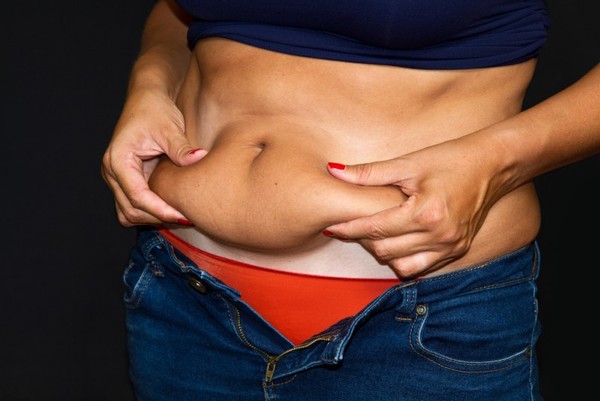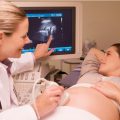 Weight after deliveryPhoto: Shutterstock Weight gain during pregnancy According to experts, it’s normal for a woman to gain between 7 and 16 kilograms during the entire pregnancy. Fragile future mothers often gain more, and overweight women may even be slightly below normal. At the same time, most of the pounds gained are not at all fat reserves - more than half of the weight will be in the weight of the fetus, uterus, placenta and amniotic fluid. In addition, in the body of a pregnant woman the volume of blood and the volume of extracellular fluid increase. There are often situations when pregnant women gain weight that is much higher than normal. On the one hand, it is connected with hormonal adjustment, on the other - with overeating, indulging one's own weaknesses, as well as with physical inactivity, often forced. Excessive weight gain in pregnant women is not welcome by specialists: overweight can lead to varicose veins, diabetes mellitus, fat mothers often give birth to large children, which may cause unforeseen complications during labor. Excess weight may also be due not so much to the accumulation of fat reserves, but to fluid in the tissues, evidence of the violation of work pochekKak changing weight after giving birth weight rodovPosle women is reduced by about 5-6 kilograms - a general, the placenta, the blood lost in the delivery. In the next few days, another 2–3 kilograms will evaporate — weight reduction will occur due to a decrease in the volume of intracellular fluid. However, it will not be possible to return to the previous weight soon, usually it takes from 6 months to two years. Remaining kilograms are provided by nature for the gradual use during lactation. On average, if a woman feeds a breast only for the first six months, she can lose about 7 kilograms without making additional efforts, but not overeating. At the same time, women who refuse to breastfeed often lose weight faster - this is due to the ability to follow any diet without restrictions to play sports. However, it is impossible to force events and try to lose weight in a couple of months - the hormonal balance after childbirth is restored slowly, to return to the “pre-pregnancy” level of hormones, at least one and a half to two letSluchaetsya, however, that nursing mothers do not lose, but rather gain weight. Often this is due to overeating and low mobility. Having become accustomed to eating during pregnancy for “two,” the woman continues to eat often and long after giving birth. In addition, older relatives can add fuel to the fire, and more often, relatives who need to eat more and slip portions of the calories so that “the child gets more nutrients.” The changed lifestyle dictates its own conditions. Often, newly-made mothers do not even have time to do gymnastics at home, not to mention going to the gym, while walking with a stroller can hardly be called a serious exercise. All this leads to an increase in weight, which is subsequently impossible to lose without serious effort. Postnatal neuroendocrine syndrome Approximately 4–5 percent of women after giving birth quickly gain a lot of excess weight. This is not due to eating disorders and not to low activity, but to a serious disease - postpartum neuroendocrine syndrome, also known as postpartum obesity. Postnatal neuroendocrine syndrome is due to impaired hormone levels: increased levels of adrenocorticotropic hormone, testosterone, prolactin, decreased progesterone levels of ovarian hormones. Most often, this disease develops in women whose pregnancy and childbirth have passed with complications (preeclampsia, overweight, increased urine). heed of sugar and cholesterol in the blood, surgical interventions during childbirth) Postpartum obesity manifests itself not only in the form of a rapid increase in body weight after delivery (8 or more kilograms), but also is accompanied by other problems: hypertrichosis, menstrual disorders, increased blood pressure, headaches , fever. For the treatment of postpartum neuroendocrine syndrome, dietotherapy, dosed exercise, medication support are used. Weight loss after childbirth Rarely, but it happens that a woman after childbirth is not fattening, but, on the contrary, is losing much weight. Often this is due to an impaired appetite due to postpartum depression, hyperthyroidism that develops after childbirth, and disturbances in the functioning of the digestive tract.
Weight after deliveryPhoto: Shutterstock Weight gain during pregnancy According to experts, it’s normal for a woman to gain between 7 and 16 kilograms during the entire pregnancy. Fragile future mothers often gain more, and overweight women may even be slightly below normal. At the same time, most of the pounds gained are not at all fat reserves - more than half of the weight will be in the weight of the fetus, uterus, placenta and amniotic fluid. In addition, in the body of a pregnant woman the volume of blood and the volume of extracellular fluid increase. There are often situations when pregnant women gain weight that is much higher than normal. On the one hand, it is connected with hormonal adjustment, on the other - with overeating, indulging one's own weaknesses, as well as with physical inactivity, often forced. Excessive weight gain in pregnant women is not welcome by specialists: overweight can lead to varicose veins, diabetes mellitus, fat mothers often give birth to large children, which may cause unforeseen complications during labor. Excess weight may also be due not so much to the accumulation of fat reserves, but to fluid in the tissues, evidence of the violation of work pochekKak changing weight after giving birth weight rodovPosle women is reduced by about 5-6 kilograms - a general, the placenta, the blood lost in the delivery. In the next few days, another 2–3 kilograms will evaporate — weight reduction will occur due to a decrease in the volume of intracellular fluid. However, it will not be possible to return to the previous weight soon, usually it takes from 6 months to two years. Remaining kilograms are provided by nature for the gradual use during lactation. On average, if a woman feeds a breast only for the first six months, she can lose about 7 kilograms without making additional efforts, but not overeating. At the same time, women who refuse to breastfeed often lose weight faster - this is due to the ability to follow any diet without restrictions to play sports. However, it is impossible to force events and try to lose weight in a couple of months - the hormonal balance after childbirth is restored slowly, to return to the “pre-pregnancy” level of hormones, at least one and a half to two letSluchaetsya, however, that nursing mothers do not lose, but rather gain weight. Often this is due to overeating and low mobility. Having become accustomed to eating during pregnancy for “two,” the woman continues to eat often and long after giving birth. In addition, older relatives can add fuel to the fire, and more often, relatives who need to eat more and slip portions of the calories so that “the child gets more nutrients.” The changed lifestyle dictates its own conditions. Often, newly-made mothers do not even have time to do gymnastics at home, not to mention going to the gym, while walking with a stroller can hardly be called a serious exercise. All this leads to an increase in weight, which is subsequently impossible to lose without serious effort. Postnatal neuroendocrine syndrome Approximately 4–5 percent of women after giving birth quickly gain a lot of excess weight. This is not due to eating disorders and not to low activity, but to a serious disease - postpartum neuroendocrine syndrome, also known as postpartum obesity. Postnatal neuroendocrine syndrome is due to impaired hormone levels: increased levels of adrenocorticotropic hormone, testosterone, prolactin, decreased progesterone levels of ovarian hormones. Most often, this disease develops in women whose pregnancy and childbirth have passed with complications (preeclampsia, overweight, increased urine). heed of sugar and cholesterol in the blood, surgical interventions during childbirth) Postpartum obesity manifests itself not only in the form of a rapid increase in body weight after delivery (8 or more kilograms), but also is accompanied by other problems: hypertrichosis, menstrual disorders, increased blood pressure, headaches , fever. For the treatment of postpartum neuroendocrine syndrome, dietotherapy, dosed exercise, medication support are used. Weight loss after childbirth Rarely, but it happens that a woman after childbirth is not fattening, but, on the contrary, is losing much weight. Often this is due to an impaired appetite due to postpartum depression, hyperthyroidism that develops after childbirth, and disturbances in the functioning of the digestive tract. Weight gain after childbirthPhoto:ShutterstockUsually women are happy when after giving birth, for no apparent reason, they manage to quickly lose the kilograms gained during pregnancy, but uncontrolled weight loss is extremely harmful, including for the child if the mother is breastfeeding.There is cause for concern if, with normal and even abundant food consumption, a woman loses 10 percent or more of her own weight in two or three monthsWeight loss is also possible if the nursing mother is prescribed . In this case, it should be remembered that such a diet does not imply malnutrition. On the contrary, the diet, even if consisting of hypoallergenic products, should be as complete as possible, and the portions should be of normal size.Treatment in each specific case is prescribed by a doctor. In the case of postpartum depression, the help of a psychotherapist may be required.Read more:
Weight gain after childbirthPhoto:ShutterstockUsually women are happy when after giving birth, for no apparent reason, they manage to quickly lose the kilograms gained during pregnancy, but uncontrolled weight loss is extremely harmful, including for the child if the mother is breastfeeding.There is cause for concern if, with normal and even abundant food consumption, a woman loses 10 percent or more of her own weight in two or three monthsWeight loss is also possible if the nursing mother is prescribed . In this case, it should be remembered that such a diet does not imply malnutrition. On the contrary, the diet, even if consisting of hypoallergenic products, should be as complete as possible, and the portions should be of normal size.Treatment in each specific case is prescribed by a doctor. In the case of postpartum depression, the help of a psychotherapist may be required.Read more:

Making Money with Desserts: Success Stories
Evgeniya Polischuk (Fedutinova) instagram:@evgeniyafedutinovavk.com/janeshomebaking– It all started with baking for family and friends. Gradually, I started posting photos of my baked goods on Instagram – and orders started coming in. I made my first custom-made cake on October 13, 2014, and a little earlier I started making macaroons and cupcakes. You could say that the business “found me”, I am very […]

Soups are cold recipes with photos
Cold cucumber soup with yogurt and lemonsorbet from the chef of the restaurant La Taverna Alexander Zhurkin Photo: Getty Images Ingredients: Plain yoghurt – 125 g Cucumber – 150 g Lemon/lime sorbet – 50 g Cocktail shrimp – 24 g Fresh ginger juice – 1 g Lime juice – 5 g Fresh orange juice – 5 g Parsley – 1 g Pink pepper – 1 g Watercress – […]

barbeque kebab
Pork tenderloin in glaze Photo:Dmitry Bayrak/dbstudioPreparation time: 20 minutes + marinating time.Calories: 454 kcal per serving.For 4 servings: 4 pork tenderloins (approximately 300 g each), 1 onion, 2 cloves of garlic, 1 tsp. lemon zest, 1 tsp. lemon juice, a pinch of ground cumin, coriander and turmeric, 1 tbsp. vegetable […]

Pierre Duacan: dietary recipes: Ducane diet
Beetroot soup Photo:Season’S, Luxury Hotels RepresentationYou will need:· Boiled beetroot – 60 g· Fresh cucumbers – 20 g· Red radish – 20 g· Green onions – 10 g· Egg – 1 pc.· Drinking mineral water – 200 g· Salt – 1 gPreparation:· Boil the egg and beetroot.· Grate the cucumbers, radish and part of the beetroot. Put everything […]





